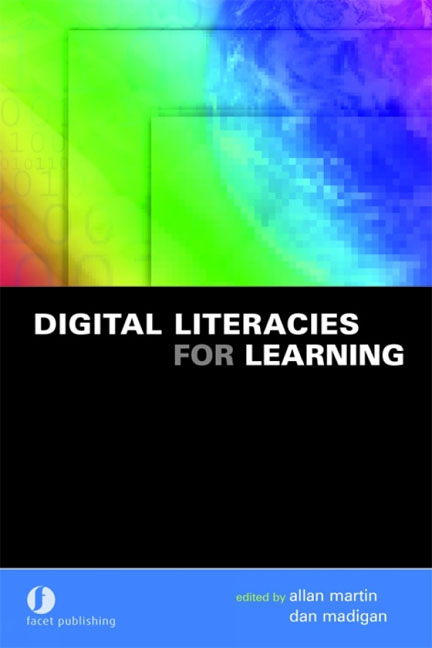Book contents
- Frontmatter
- Contents
- Dedication
- The contributors
- Foreword
- Preface
- Part I Literacies in the digital age
- 1 Literacies for the digital age: preview of Part 1
- 2 Learners, learning literacy and the pedagogy of e-learning
- 3 Real learning in virtual environments
- 4 Digital fusion: defining the intersection of content and communications
- 5 Literacy and the digital knowledge revolution
- 6 Understanding e-literacy
- 7 Information literacy – an overview
- 8 Contemporary literacy – the three Es
- 9 Reconceptualizing media literacy for the digital age
- 10 Literacy, e-literacy and multiliteracies: meeting the challenges of teaching online
- 11 Graduate e-literacies and employability
- Part II Enabling and supporting digital literacies
- Index
2 - Learners, learning literacy and the pedagogy of e-learning
from Part I - Literacies in the digital age
Published online by Cambridge University Press: 08 June 2018
- Frontmatter
- Contents
- Dedication
- The contributors
- Foreword
- Preface
- Part I Literacies in the digital age
- 1 Literacies for the digital age: preview of Part 1
- 2 Learners, learning literacy and the pedagogy of e-learning
- 3 Real learning in virtual environments
- 4 Digital fusion: defining the intersection of content and communications
- 5 Literacy and the digital knowledge revolution
- 6 Understanding e-literacy
- 7 Information literacy – an overview
- 8 Contemporary literacy – the three Es
- 9 Reconceptualizing media literacy for the digital age
- 10 Literacy, e-literacy and multiliteracies: meeting the challenges of teaching online
- 11 Graduate e-literacies and employability
- Part II Enabling and supporting digital literacies
- Index
Summary
Abstract
This chapter outlines the landscape of e-learning and considers how learners can flourish within it. It traces the development of understanding about pedagogy that underpins technology-enhanced learning, describing the shift in emphasis from the delivery of powerful representations of the subject matter, through the computer as tutor, to the current focus on dialogue in learning communities. Increasingly, the pedagogical focus is on the emergence of tools that support participation in learning groups, and the formation of learning relationships. The chapter describes one approach that attempts to capitalize on a neglected form of learning: ‘vicarious’ learning, which occurs as a consequence of observing other learners. This leads to consideration of Wenger's recent call for a new discourse based on the ‘horizontalization’ of learning. The chapter concludes by describing a view of ‘learning literacy’ that places willingness and confidence to participate in new learning relationships as the key requirements. These characteristics depend not on skill so much as on developing an identity as a learner.
Introduction
In a paper called ‘Learning Technology and Groundhog Day’ (Mayes, 1995) the author argued that the field of educational technology was locked into a cycle of high expectation followed by disappointment, reminiscent of the protagonist in the film ‘Groundhog Day’ who wakes up each morning to find that it is the same day, with the same outcomes repeated indefinitely. The moral of the film was that escape would be possible only when the victim acknowledged his true nature. Only when we understand the true nature of learning, the paper argued, could we expect the technology of learning to be applied in a genuinely effective way.
Today we want to point to the first real signs that escape from Groundhog Day is close. It has not happened yet. For a lasting escape it is probably necessary for the policy-makers in education and training to question the assumptions about learning that underpin their role as ‘providers’.
- Type
- Chapter
- Information
- Digital Literacies for Learning , pp. 26 - 33Publisher: FacetPrint publication year: 2006



